Did you know that onions are one of the most widely consumed vegetables in the world? In fact, the average American consumes over 20 pounds of onions each year! With such high demand, it’s important to know how to store onions properly to keep them fresh and flavorful for as long as possible.
Whether you use onions as a base for soups, a topping for salads, or a key ingredient in your favorite recipes, understanding the best way to store onions can make a big difference in their longevity and quality. So, let’s explore some smart tips and techniques for preserving onions and keeping them fresh.
Key Takeaways:
- Proper storage helps maintain the freshness and flavor of onions.
- Onions should be stored in a cool, dry, and well-ventilated area.
- Choosing the right storage container is essential to allow for proper airflow.
- Storage onions can last for about three months when stored in optimal conditions.
- Avoid storing onions near potatoes or fruits to maintain their quality.
Where to Store Onions
When it comes to storing onions, the right environment is key to keeping them fresh and flavorful. Here are some effective techniques and storage options for storing onions at home:
The best place to store onions is in a cool, dry, and well-ventilated area.
Conventional “storage” onions should be kept in a cool and dry space away from direct sunlight, moisture, and heat. This helps prevent premature sprouting or spoilage. Consider storing them in:
- Mesh bags
- Paper bags
- Milk crates
- Baskets
These containers allow for good ventilation, aiding in air circulation and reducing the risk of moisture buildup. It’s important to choose a storage container that allows for proper airflow, keeping the onions fresh for a longer duration.
If you have organic onions, they fare better in cooler temperatures. For optimal storage, place them in the crisper drawer of your refrigerator. This helps maintain their freshness and prolongs their shelf life.
Choosing the Right Onion Storage Containers
When selecting storage containers for onions, prioritize those that provide sufficient airflow to prevent moisture accumulation. The following options work well:
| Container Type | Advantages |
|---|---|
| Mesh bags | All-around ventilation |
| Paper bags | Lightweight and breathable |
| Milk crates | Sturdy with ample space for air circulation |
| Baskets | Attractive, rustic containers with built-in ventilation |
These containers allow air to flow freely around the onions while protecting them from direct sunlight and excess moisture.
By storing your onions in the right location and using suitable storage containers, you can extend their shelf life and ensure they remain fresh for all your culinary endeavors.
How Long Do Onions Last
Prolonging the shelf life of onions is crucial to ensure their freshness and flavor. Understanding how long onions typically last can help you in organizing your pantry and meal planning. Here’s what you need to know about preserving onions and their shelf life.
Storage Onion Shelf Life
When storage onions are properly cured and stored under optimal conditions, they can last for about three months. It is important to provide the right environment for these onions to maintain their quality and flavor. Stored in a cool and dry place, away from direct sunlight and moisture, they can retain their freshness for an extended period.
However, once storage onions are cut into, their shelf life significantly decreases. Here’s a breakdown of how long different forms of cut onions can last:
- Halved onions can be refrigerated and remain fresh for about five days.
- Finely chopped or sliced onions have a shorter shelf life and are best consumed within a day or two.
It is advisable to use onions within their optimal shelf life to enjoy the best possible flavor and freshness.
Now that we understand the shelf life of onions, let’s explore the best practices for storing different onion varieties to help keep them fresh for longer.
Best Practices for Preserving Onions
“Properly storing onions can extend their shelf life and keep them fresh.”
| Onion Variety | Storage Guidelines |
|---|---|
| Storage Onions | Store in a cool, dry place with good ventilation, away from direct sunlight, moisture, and heat. |
| Halved Onions | Refrigerate in an airtight container for up to five days. |
| Chopped or Sliced Onions | Best consumed within a day or two. |
Following these storage guidelines can help you preserve onions and extend their shelf life, ensuring you have fresh onions whenever you need them.
Onions and Other Foods
When it comes to storing onions, it’s important to consider their compatibility with other foods. Onions have specific storage requirements that may not align with certain food items, such as potatoes and apples.
First and foremost, onions and potatoes should not be stored together. Potatoes release moisture as they age, which can accelerate the deterioration of onions and lead to spoilage. To keep both vegetables fresh and flavorful, store them separately.
“Onions and potatoes should never be stored together as the moisture released by potatoes can cause onions to deteriorate more quickly.”
Onions can also impart their strong aroma to other foods, especially fruits like apples. If stored in close proximity, apples may absorb the pungent scent of onions, affecting their taste and quality. To prevent flavor contamination, it’s best to store onions and apples in separate locations.
“To maintain the quality and flavor of both onions and other foods, it’s crucial to store them separately. Onions can impart their pungent aroma to fruits, so it’s advisable to keep them apart.”
By practicing proper storage and separation, you can ensure that both onions and other foods maintain their optimal quality and flavor.
Storage Compatibility Guide
| Foods | Compatible with Onions? |
|---|---|
| Potatoes | No |
| Apples | No |
| Carrots | Yes |
| Garlic | Yes |
| Cabbage | Yes |
Note: This table provides a general guide, but it’s essential to consider individual storage requirements for each food item.
Best Practices for Storing Whole Onions
When it comes to storing whole onions, proper conditions are key to maintaining their freshness and extending their shelf life. Here are some best practices to store your onions properly:
- Choose the right storage location: Whole onions should be stored in a cool, dark, and dry place. Optimal storage locations include a pantry, basement, or garage. These areas provide the ideal temperature and environment to keep your onions fresh for a longer period. Avoid storing onions in areas with high humidity or exposure to sunlight, as these conditions can promote spoilage.
- Avoid plastic bags: To allow for proper airflow, it is important to remove onions from plastic bags. Instead, use a basket or netted bag to store your onions. This allows air to circulate around the onions, preventing moisture buildup and helping to preserve their quality.
- Do not refrigerate whole onions: Although refrigeration can be an excellent storage option for certain foods, it is not recommended for whole onions. The excess moisture in the refrigerator can lead to premature spoilage and a shorter shelf life for your onions. It is best to store whole onions in a cool, dry, and well-ventilated area.
By following these best practices, you can ensure that your whole onions remain fresh and flavorful for an extended period. Proper storage is essential for maintaining the quality of your onions, allowing you to enjoy their taste in your favorite recipes.
| Storage Tip | Result |
|---|---|
| Choose a cool, dark, and dry storage location | Preserves freshness and prolongs shelf life |
| Avoid plastic bags | Allows proper airflow to prevent moisture buildup |
| Do not refrigerate whole onions | Prevents premature spoilage and maintains taste |
Storing Peeled Onions
When it comes to storing peeled onions, it is important to follow proper techniques to minimize the introduction of bacteria and ensure their freshness and quality. By taking a few simple steps, you can extend the shelf life of peeled onions and keep them ready for use in your favorite recipes.
- Choose an airtight container: Place the peeled onions in a thick, zip-top bag and squeeze out as much air as possible before sealing it tightly. This helps create a protective barrier and prevents the onions from being exposed to air, which can cause them to spoil faster.
- Refrigerate in the crisper drawer: Store the sealed bag of peeled onions in the crisper drawer of your refrigerator. This section maintains a slightly higher humidity level, which helps keep the onions from drying out.
- Avoid storing with strong-smelling foods: To prevent the peeled onions from absorbing odors, store them separately from other strong-smelling foods in the refrigerator. This will help maintain their flavor and prevent any unwanted aromas.
By following these storage techniques, you can store peeled onions in the refrigerator for up to two weeks while maintaining their freshness and quality.
Storing Cut Onions
When it comes to storing cut onions, proper storage is key to maintaining their freshness and quality. Here are some tips on how to store chopped onions to ensure they stay fresh for longer.
- Use an airtight container: Transfer the cut onions into an airtight container before placing them in the refrigerator. This will help preserve their flavor and prevent the strong onion aroma from spreading to other foods.
- Reduce excess moisture: Chopped, sliced, or diced onions release more moisture, which can encourage bacterial growth and cause them to spoil faster. To reduce excess moisture, consider using a storage container with a shelf that has drain holes. This allows any excess liquid to drain away, keeping the onions drier and fresher.
- Tightly wrap leftover halves or quarters: If you have leftover halves or quarters of an onion, tightly wrap them with plastic wrap or food wrap before storing them in an airtight container. This additional layer of protection helps extend their shelf life and maintain their crispness.
Proper storage of cut onions helps retain their flavor, texture, and aroma for longer, ensuring that you have fresh onions readily available for your culinary endeavors.
By following these storage tips, you can enjoy the full potential of your cut onions and minimize waste.
Remember, freshness matters, even when it comes to chopped onions!
Tips for Storing Cut Onions
| Storage Tips | Description |
|---|---|
| Use an airtight container | Transfer cut onions into an airtight container before refrigerating to preserve their flavor and prevent aroma transfer. |
| Reduce excess moisture | Choose a storage container with a shelf that has drain holes to minimize moisture and bacterial growth. |
| Tightly wrap leftover halves or quarters | Extend shelf life and maintain freshness by tightly wrapping leftover halves or quarters with plastic or food wrap. |
Storing Cooked Onions
When it comes to preserving cooked onions, proper storage is key. To maintain their flavor and freshness, follow these simple steps:
- Transfer the cooked onions to an airtight container.
- Store the container in the refrigerator within two hours of cooking.
- Consume the cooked onions within three to five days for optimal taste and quality.
While storing cooked onions is possible, it’s important to note that their flavor may be affected over time. For the best results, try to consume them within the recommended timeframe.
Fried onions, in particular, may lose their crispness when stored. To enjoy their texture and taste, it’s recommended to consume fried onions fresh.
Expert Tips:
For longer preservation, consider freezing your cooked onions. Simply place them in a freezer-safe container or bag and store them for up to three months. Thaw the onions in the refrigerator before using them.
Comparison of Storage Methods:
| Storage Method | Shelf Life | Flavor and Texture |
|---|---|---|
| Refrigerator (Airtight Container) | 3-5 days | Good, but may affect flavor over time |
| Freezer (Freezer-Safe Container) | Up to 3 months | Preserves flavor and texture when thawed properly |
By following these storage tips, you can preserve the cooked onions for varying durations while maintaining their taste and quality. Whether you prefer them fresh or need to store them for later use, these guidelines will help you enjoy the delicious flavor of cooked onions in your favorite dishes.
How to Store Green Onions, Shallots, and Chives
When it comes to storing green onions, shallots, and chives, each variety requires its own specific method to maintain optimal freshness.
Storing Green Onions
To store green onions, I recommend refrigerating them with their roots in water. This can be done by placing the green onions in a glass or jar with enough water to cover the roots. To prevent wilting, cover the green tops with a plastic bag. This method helps to maintain their crispness and flavor for longer.
Storing Shallots
Shallots are best stored in a dark, cool, and well-ventilated place, similar to whole onions. Find a location in your kitchen or pantry that meets these conditions, and store your shallots there. Avoid storing them near sources of heat or direct sunlight as this can affect their taste and quality.
Storing Chives
Chives can be stored by placing them in a zip-top bag. Be sure to retain some air inside the bag before sealing it. This helps to create the optimal environment for chives in the refrigerator. The cool temperature will help to maintain their freshness and vibrant green color.
By following these storage methods, you can enjoy the distinct flavors and freshness that green onions, shallots, and chives contribute to your dishes.
Summary Table: Storing Green Onions, Shallots, and Chives
| Variety | Storage Method |
|---|---|
| Green Onions | Refrigerate with roots in water and green tops covered with plastic bag |
| Shallots | Store in a dark, cool, and well-ventilated place |
| Chives | Place in a zip-top bag with some air sealed inside and store in the refrigerator |
Conclusion
Properly storing onions is key to preserving their freshness and flavor for longer periods. By implementing these simple tips and techniques, you can extend the shelf life of your onions and ensure they remain fresh for all your culinary needs. Whether you have whole onions, peeled onions, cut onions, or cooked onions, following the right storage practices will make a significant difference in maintaining their quality.
Remember to store whole onions in a cool, dark, and dry place with good ventilation, such as a pantry or garage. Utilize mesh bags or baskets to allow for proper airflow. For peeled onions, place them in an airtight container in the refrigerator, ensuring minimal exposure to bacteria. Cut onions should also be stored in the fridge using an airtight container or by tightly wrapping them in plastic wrap.
Additionally, it’s important to keep onions separated from potatoes and fruits like apples, as they can affect the onions’ shelf life and flavor. By incorporating these best practices into your onion storage routine, you can enjoy long-lasting and fresh onions whenever you need them in your culinary creations.


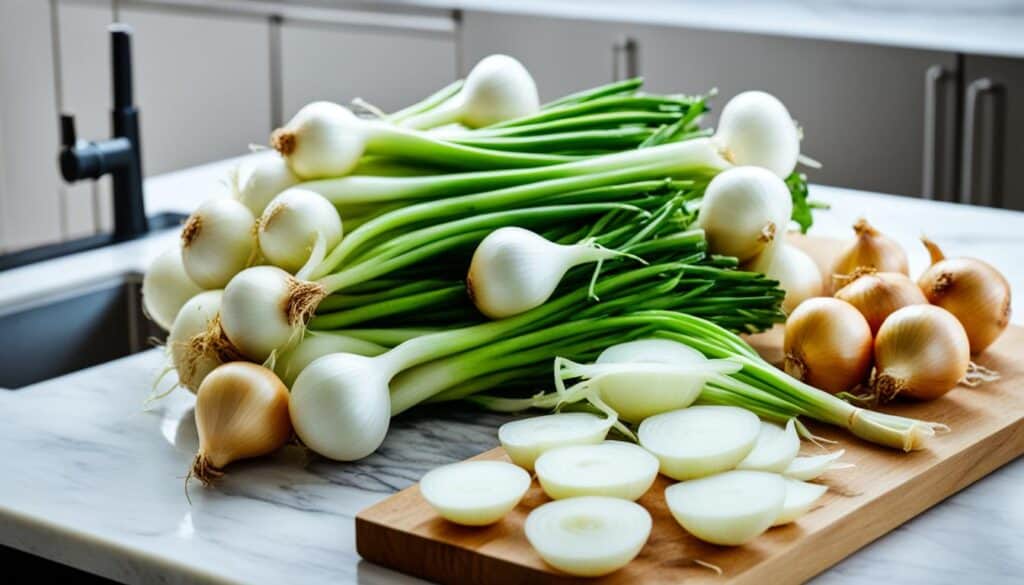
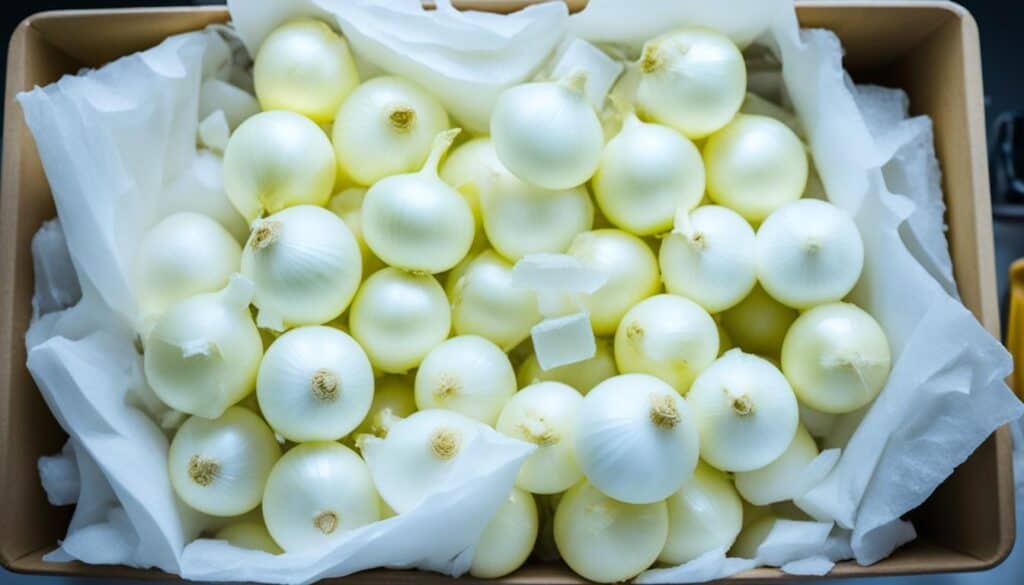
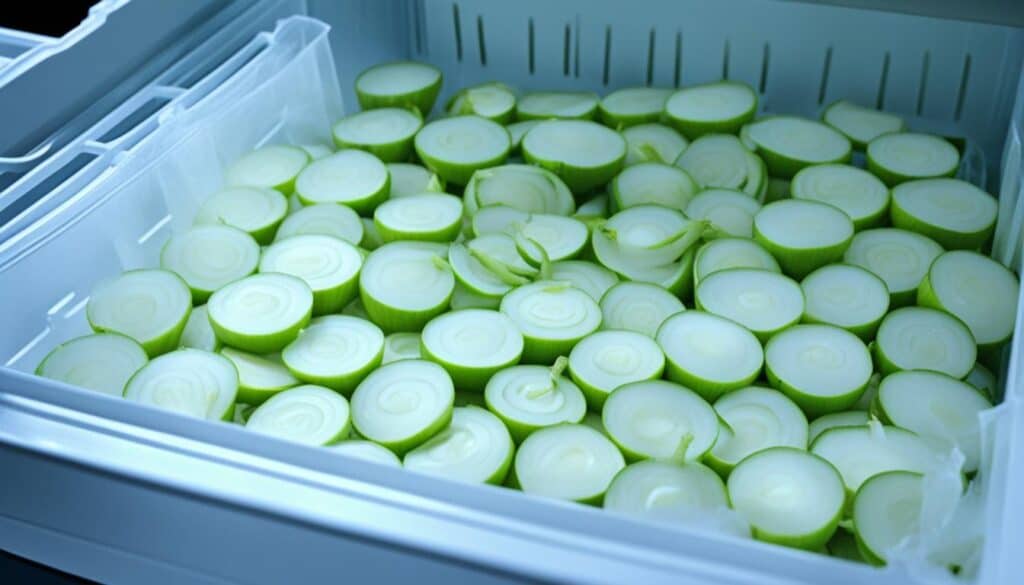
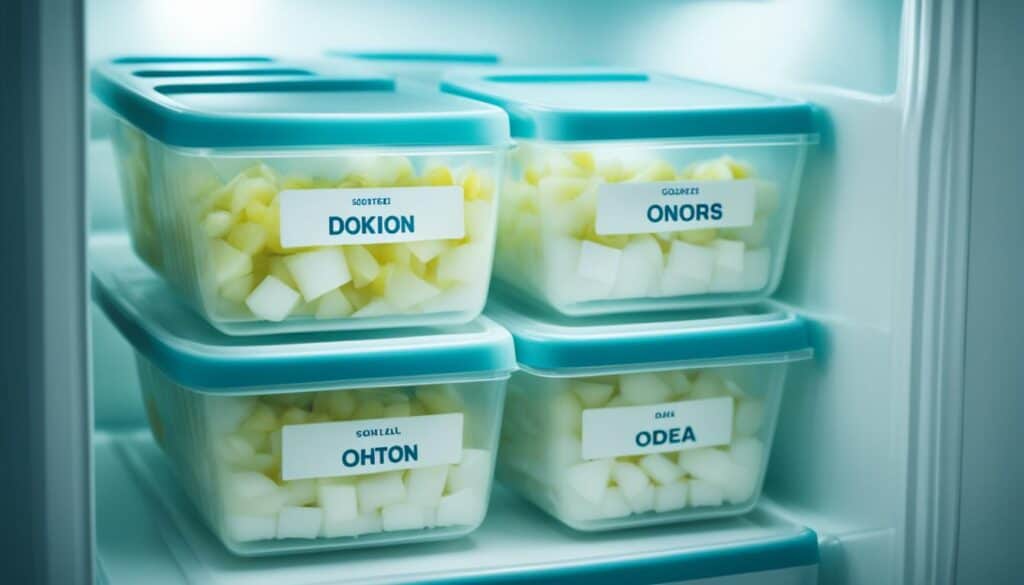
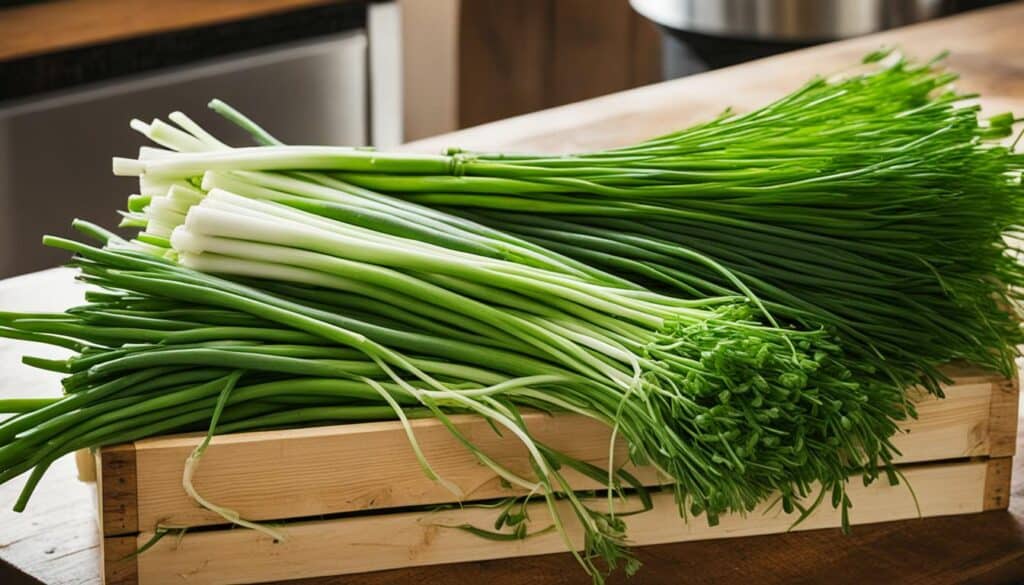



Leave a Reply